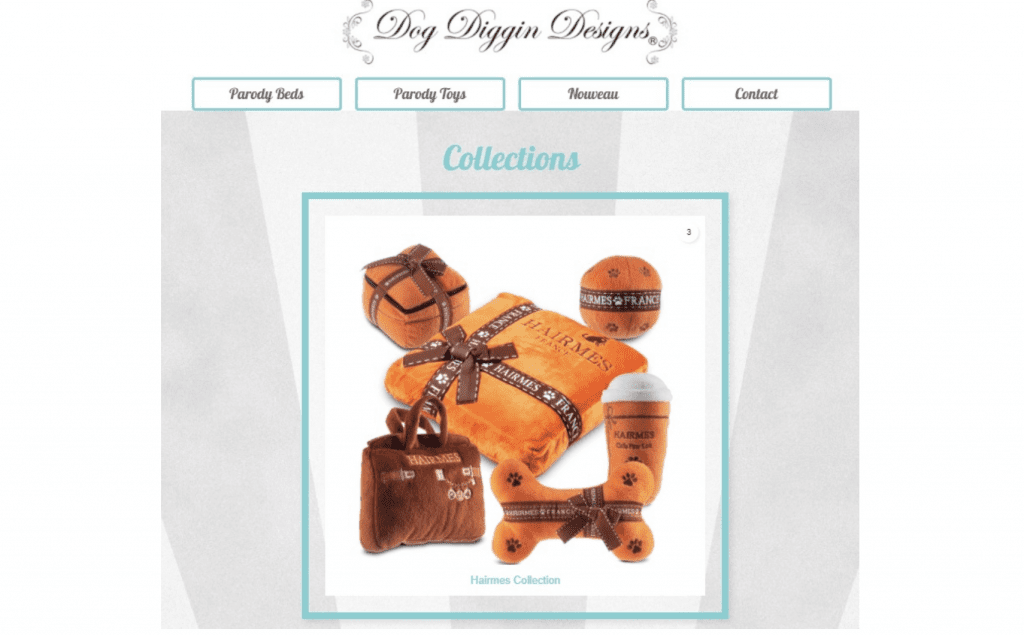Amid a number of notable trademark clashes in the U.S. that have revolved around “parody” dog toys, including the Bad Spaniels case that the Supreme Court decided in June, Hermès has prevailed in something of a similar fight in Japan. In a decision on July 26, the Japan Patent Office’s Invalidation Board (“Board”) handed the Birkin bag-maker a win in its bid to have Dog Diggin Designs’ trademark registration for “HAIRMES” for use on pet supplies, including dog toys, reversed, with the trademark Board finding that despite an earlier determination to the contrary, consumers are likely to be confused by the rival trademark.
Siding with Hermès, the Board held that while the French luxury goods company’s HERMÈS trademark and the dog toy company’s use of HAIRMES are different – both in sound and concept, they, nonetheless, “give a similar visual impression” by virtue of the fact that they have the same first letter and the same final four letters, “which catches the attention of consumers.” As a result, the Board said that it has reason to believe there is a certain degree of similarity between the two marks.
Also weighing in Hermès’ favor in the eyes of the Board: The similarity between the look of Dog Diggin Designs’ dog toys and the design – and color – of Hermès’ product packaging. (The color comment is striking given that the Board determined in a separate matter this spring that Hermès’ orange packaging is “not recognized to indicate the origin of goods or services and distinguish them from competitors.”) Against that background, Osaka-based trademark attorney Masaki Mikami reported that the Board took the view that Dog Diggin Designs, “knowing that the HERMÈS mark has been widely recognized among consumers in Japan, must have had an intention to free-ride [on] or dilute reputation [the] HERMÈS [brand].”

Moreover, the Board noted the not-too-dissimilar nature of Dog Diggin Designs’ offerings and fashion/lifestyle products more broadly. (It is worth noting, after all, that Hermès sells everything from canvas dog houses and carrying bags to leashes and dog beds and toys.) As such, the Board invalidated the disputed trademark registration in its entirely.
Interestingly enough, the cancellation comes in contrast to the outcome of an earlier proceeding that Hermès initiated in an effort to have Dog Diggin Designs’ mark invalidated. Hermès lodged a post-grant invalidation action with the Japan Patent Office (“JPO”) back in 2020, arguing that Dog Diggin Designs was piggybacking on the fame and appeal of its brand by way of its use of the HAIRMES mark on goods that mirror its product packaging. In what would prove to be a preliminary win for Dog Diggin Designs, the JPO found that there was a low level of similarity between the marks and thus, a low likelihood that consumers would be confused about the source/nature of Dog Diggin Designs’ HAIRMES offerings. Without taking Hermès’ product packaging design into account, the JPO dismissed its opposition and permitted Dog Diggin Designs’ since-cancelled registration to remain intact.
THE BIGGER PICTURE: While the Board did not seem to place too much weight in its decision on the fact that Hermès offers up pet supplies of its own, the matter should, nonetheless, serve as the latest indication for brands that expansion into categories beyond their most immediate offerings could prove particularly useful – not just from a revenue standpoint but in enforcement scenarios, as well. Had the Board been less convinced on the issue of similarity, Hermès has an array of pet-specific goods that it could point to in order to close any potential product-specific gaps.
This is a reminder that companies should be thinking about how to consistently grow their existing trademark rights. One way to do that is to offer up a wider array of classes of goods/services, which is what Hermès did by parlaying its existing lifestyle offerings into pet products to cater to its dog-owning (and deep-pocketed) customers. Another common way to achieve such expansion is via collaborations and/or licensing deals with other companies that specialize in – or are otherwise known for – their production of certain goods/services. The best and most timely example here is the extension of Brand Barbie beyond toys and doll accessories to everything from Barbie-themed pool floats to pink sauced Barbie burgers from Burger King, which Mattel achieved via widespread licensing deals.

In addition to bolstering brand awareness and generating revenue, deals like this – i.e., ones that see brands branch out into new categories of goods/services – help them to broaden their trademark rights. This can, in turn, enable them to successfully go after wider pool of infringers, including in situations where the allegedly infringing goods/services are not immediately related.
There are arguments to be made about the potential risks/downsides for brands that are consistently expanding into new categories by way of in-house efforts and/or collaborations, including dilution or overexposure; we previously raised these questions (and came up with some answers) with regards to Virgil Abloh/Off-White’s once-very-long roster of partners. However, it seems like the risk of dilution could be less of an issue than in the past due to ongoing shifts in the nature/frequency of collabs, namely, an onslaught of co-branded collections that go as far as seeing fast food chain McDonald’s team up with Palace skateboards, Louis Vuitton partner with Supreme, and even rival fashion companies like Fendi and Versace send co-branded wares down the runway. The result is a seeming normalization of such partnerships and their at-times unexpected offerings. All the while, the routinely limited – and often meticulously-controlled – nature of such collaborations probably also serves to limit issues for the brands involved.
Hermès’ slow but steady expansion beyond traditional leather goods to things like homewares and dog leashes is unlikely to chip away at its image while still enabling it to benefit from heightened/expanding protections for its famous trademarks. The flip side is maybe Mattel’s market-domination approach in connection with the recent launch of the Barbie movie. We will keep an eye on how that plays out for the toy giant.











